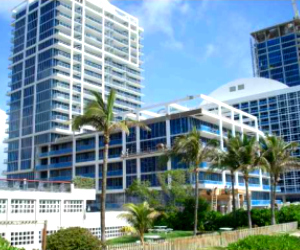Interesting mix of flops:
 The declining economy has hit the commercial real estate industry quite hard, especially some of the higher end projects ranging from office buildings to resorts as outlined by CNN.
The declining economy has hit the commercial real estate industry quite hard, especially some of the higher end projects ranging from office buildings to resorts as outlined by CNN.
The high profile victims of the economy are noted below with an interestingly high number of busts in New York City and a concentration of office buildings.
The 10 biggest commercial real estate busts:
- Stuyvesant Town & Peter Cooper Village in New York City ($3 billion) When insurance giant MetLife put the 11,000-unit apartment complex on the block in 2006, it became one of the most coveted commercial properties, sparking a fierce bidding war. In the span of a little more than three years however, Stuyvesant Town/Peter Cooper Village quickly morphed from the proverbial brass ring into a white elephant as its buyers choked on the massive amount of debt used to finance the purchase. The owners handed over the property to its creditors in January.
- General Motors Building in New York City ($2.9 billion) New York City real estate mogul Harry Macklowe proved that in the world of commercial real estate, there can be too much of a good thing. In 2007, he scooped up seven Manhattan office buildings from private equity giant Blackstone Group, with the hopes of dramatically expanding the size of his real estate empire. However, the loans used to make those purchases became nearly impossible to refinance once credit markets started to freeze up shortly thereafter. As a result, Macklowe’s firm was forced to sell off some of those properties, including what perhaps was his most prized trophy: the General Motors building.
- Treasure Island Hotel Casino in Las Vegas ($775 million) Struggling with a difficult economic climate and hoping to raise some quick cash for its ambitious cross-town City Center venture, the casino operator sold the resort and its famous pirate battle display last March for a mere $775 million. Scooped up by Kansas billionaire Phil Ruffin, various estimates have placed the site’s replacement value at nearly four times that amount at $2.7 billion, according to commercial real estate research firm CoStar Group.
- John Hancock Tower in Boston ($660.6 million) Relying on massive amounts of financing, an ambitious New York City-based investment firm scooped up New England’s tallest office building in 2006 for an eye-popping $1.3 billion, betting that Boston’s office rental market and commercial property values would continue to remain red hot. What they never anticipated, like so many other real-estate speculators, was the precipitous decline in property values and a spike in the nation’s unemployment rate to above 10%, which drastically weakened demand for office space across the country. Unable to service the debt load, the property was sold in a foreclosure auction last March for less than half of the original purchase price.
- Universal City Plaza in Universal City, California ($304.8 million) When the Hancock Tower stumbled, so did Universal City Plaza. Sold together as part of a portfolio of foreclosed holdings last March, the property became one of the more high-profile casualties of the Southern California commercial real estate market since the start of the recession. Home to a number of media and entertainment companies, including NBC Universal and Universal Music, the 36-story building and surrounding land is now jointly owned by a pair of East Coast distressed investment firms.
- Canyon Ranch in Miami ($308.5 million) In the world of commercial real estate, history does sometimes have a habit of repeating itself. For years, the Carillon Hotel was a fixture of the Miami Beach scene, only to be shuttered in the late 1980s as a result of a tough economic climate. After a massive overhaul, the property reopened in 2008 as a hotel-condominium combination under the banner of Canyon Ranch, a well-respected name within the wellness community. That venture however would stumble yet again as a result of the recent economic downturn. Last fall, its developers handed over the remaining 300-plus unsold condos to its creditors. Despite that hiccup, the Canyon Ranch development appears to be moving full steam ahead. More than 60 units have been sold since May and another 20 contracts are waiting to be completed, according to its current owners.
- Pearson Building in New York City ($241 million) While the loss of the GM building was mostly a reputational setback for Harry Macklowe, the impact of his company’s foreclosure sale of the Pearson building in Midtown Manhattan was a severe financial blow. Unable to service its mortgage debt, the company lost the building in an auction last June to Otera Capital, a division of one of Canada’s biggest pension funds. The Canadian firm paid $241 million, according to CoStar Group. That’s less than half of what Macklowe Properties bought it for in 2006.
- Maui Prince Resort in Maui ($192.5 million) One particularly notable tale has been that of the former Maui Prince Resort, a spectacular 1,800-acre resort at the foot of Mount Haleakala that boasts 310 rooms and a Robert Trent Jones-designed golf course. An investment fund run by Morgan Stanley teamed up with a local firm in Maui to buy the property in 2007 for $575 million with the hope of developing it. Those plans quickly unraveled however as tourism to the state took a severe decline as a result of the recession.
- Resorts Casino Hotel in Atlantic City, NJ ($115 million) When it expanded its operations in 1978 to include gambling, Resorts earned the distinction of becoming Atlantic City’s first casino. Its position as the granddaddy of the New Jersey gambling circuit hardly insulated the property when the economy tanked. Faced with fewer visitors and declining gaming revenues, Resorts’ mortgage troubles started to mount in late 2008. By the following fall it was embroiled in foreclosure proceedings, before finally handing over the keys to its lenders late last year.
- The Watergate Hotel in Washington, D.C. ($25 million) Part of the residential-office complex that ultimately led to President Richard Nixon’s resignation, the Watergate Hotel went into foreclosure last summer after its owner defaulted on a $40 million loan. The borrower’s original plans of refurbishing the 251-room luxury hotel however may still indeed happen. A messy legal fight over the hotel’s garage between the bank and neighboring residents however have delayed such efforts.
In this article:commercial real estate, real estate economics
Written By
Lani Rosales, COO + News Director
Lani is the COO and News Director at The American Genius, has co-authored a book, co-founded BASHH, Austin Digital Jobs, Remote Digital Jobs, and is a seasoned business writer and editorialist with a penchant for the irreverent.

13 Comments







































Justin Boland
April 7, 2010 at 1:14 pm
Fascinating read, thank you…didn’t catch this on CNN, but I don’t exactly hang out there either.
Kevin Tomlinson
April 7, 2010 at 1:54 pm
Lani,
Great, great review. You hit them all on nose. Wow! Great job.
Canyon Ranch was taken over by Lehman, who is now technically the developer (good thing).
Canyon Ranch is a flawless product but it just came to market at WORST possible time
I can tell you I’ve closed three deals there in the last weeks and the clip at which things are selling is surprising.
I had some organic wine there last week in the lobby–and it was bustling.
CR will do well–its a new development on the ocean in Miami Beach.
Nashville Grant
April 8, 2010 at 9:27 pm
The biggest commercial bust also happened to be funded with mostly CALIPER’s funds…poor California takes another hit.